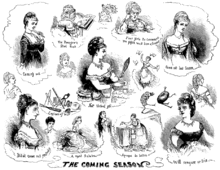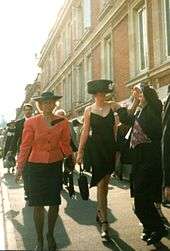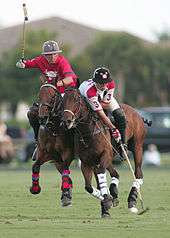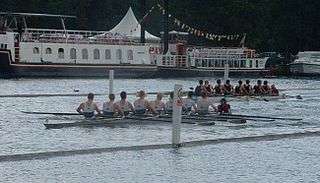Season (society)
The social season, or season, refers to the traditional annual period when it is customary for members of a social elite of society to hold balls, dinner parties and charity events. Until World War I, it was also the appropriate time to be resident in the city rather than in the country in order to attend such events.

In modern times in the United Kingdom, "the Season" is known to encompass various prestigious events that take place during the spring and summer. According to Sloaney Season, it starts with Cheltenham Festival (March), and includes the Grand National (April), The Boat Race (April), Badminton Horse Trials (May), Chelsea Flower Show (May), Epsom Derby (June), Royal Ascot (June), Test matches at Lord's (July), Wimbledon (July), Henley Royal Regatta (July), Edinburgh Festival Fringe (August) and others, ending with Goodwood Revival (September).[1]
Social season of London


The London social season evolved in the 17th and 18th centuries, and in its traditional form it peaked in the 19th century. In this era the British elite was dominated by landowning aristocratic and gentry families who generally regarded their country house as their main home, but spent several months of the year in the capital to socialise and to engage in politics. The most exclusive events were held at the town mansions of leading members of the aristocracy. Exclusive public venues such as Almack's played a secondary role. The Season coincided with the sitting of parliament; it began some time after Christmas and ran until midsummer, roughly late June.[2]
The social season played a role in the political life of the country: the members of the two Houses of Parliament were almost all participants in the season. But the Season also provided an opportunity for the children of marriageable age of the nobility and gentry to be launched into society. Debutantes were formally introduced into society by presentation to the monarch at royal court during Queen Charlotte's Ball until the practice was abolished by Queen Elizabeth II in 1958. Queen Charlotte's Ball ceased to function in 1976, but has been relaunched since without the monarch's involvement, and with more limited uptake; debutantes instead curtsy to "Queen Charlotte's Birthday Cake".[3]
The traditional Season went into decline after the First World War, when many aristocratic families gave up their London mansions. From then on, more society events took place at public venues, making it harder to maintain social exclusivity.
Many events that take place far from central London came to be regarded as part of the social season, including Royal Ascot and the Henley Royal Regatta. The events that now constitute the London social season are increasingly hosted or sponsored by large companies (i.e. "corporate hospitality"). Western dress codes still apply to certain events in the season, especially where the Queen maintains an official role.
According to the peerage guide Debrett's, the traditional social season runs from April to August.[4]
Arts
- Glyndebourne Opera Festival
- The Proms
- Royal Academy Summer Exhibition
- West End theatre
Horticulture
Equestrianism
- Royal Ascot
- Cheltenham Gold Cup
- Badminton Horse Trials
- Grand National
- Royal Windsor Horse Show
- Epsom Derby
- Glorious Goodwood
- Cartier Queen's Cup
The Crown
- Trooping the Colour
- Garter Service of the Order of the Garter
- Royal Edinburgh Military Tattoo
Sport
- Boat Race
- Henley Royal Regatta
- Guards Polo Club
- The Championships, Wimbledon
- Cowes Week
- Lord's Test cricket match
Although several of these events are not actually held in London, such as the Hurlingham Polo Association at Guards Polo Club, the organisers of most events attempt to avoid date clashes, so it is generally possible to visit all of them in the same year.
The traditional end of the London Season is the Glorious Twelfth of August, which marks the beginning of the shooting season. Society would retire to the country to shoot birds during the autumn and hunt foxes during the winter before coming back to London again with the spring.
Dress codes
Many events of the season have traditional expectations with regard to Western dress codes.
- At Royal Ascot, for example, hats are compulsory in most enclosures, and to be admitted to the Royal Enclosure for the first time one must either be a guest of a member or be sponsored for membership by two members who have attended for at least six years as a member. This continues to maintain a socially exclusive character for the Royal Enclosure. Gentlemen are required to wear either black or grey morning dress with waistcoat and a top hat. A gentleman may remove his top hat within a restaurant, a private box, a private club or that facility's terrace, balcony or garden. Hats may also be removed within any enclosed external seating area within the Royal Enclosure Garden. Ladies must not show bare midriffs or shoulders and must wear hats. In the Queen Anne Enclosure (formerly known as the Grandstand), gentlemen are required to wear lounge suits with ties and ladies must wear a hat.[5]
- At Henley Royal Regatta, in the Stewards' Enclosure gentlemen must wear a lounge jacket and tie. Rowing club colours on a blazer or cap are encouraged, as is the wearing of boaters. A lady's skirt hem must reach below the knee and is checked before entry by the Stewards' Officers. Both ladies and gentlemen will be turned away if they fail to comply with the dress code, no matter what their prestige in rowing or elsewhere. Hats are encouraged but not required for ladies.[6] When a student protested being denied entry to the Stewards' Enclosure for failing to meet the dress code, saying she had worn the dress "in the Royal Enclosure at Ascot and nobody said anything", a spokesman defended the dress code, saying "The intention is to maintain the atmosphere of an English Garden party of the Edwardian period by wearing a more traditional dress."[7] Members must display their enamel badges at all times. Anyone found using a mobile phone is asked to leave immediately and their Stewards' Enclosure host, identified by the number on the guest's badge, may have his membership withdrawn as a result.
- At polo matches, it is usual for gentlemen to wear a blazer and always white trousers. Ladies should wear flat shoes, as the tradition of "treading in the divots" precludes wearing heels. The famous Club House at Guards Polo Club in Windsor Great Park is for the use of club members only, who wear individually made gold and enamel badges. Members' guests are given special gold-embossed tags.
In popular culture
- A London Season features in Jane Austen's Sense and Sensibility and is often a key plot device in Regency romance novels.
- The novel Lucia in London by E. F. Benson is set during the London season in the 1920s.
- The novel Death in a White Tie, by Ngaio Marsh, is set during the London season of 193&.
- Edith Wharton's The Age of Innocence uses the New York social season as a backdrop.
- The novel The Leopard by Giuseppe Tomasi di Lampedusa, and the film by Luchino Visconti, portray the Palermitan season during the Risorgimento.
- Julian Fellowes's novel Past Imperfect takes place during the 1968 season in London.
- In the 2003 film What a Girl Wants, Lord Henry Dashwood invites his new-found daughter Daphne to attend the London Season.
- The 2009 young-adult novel The Season by Sarah MacLean portrays a young woman entering her first London Season.
- Vincente Minnelli's The Reluctant Debutante
- The British period drama Downton Abbey the outspoken youngest daughter of the fictional Earl of Grantham, Lady Sybil, is presented as a debutante at court in London during her first season. The family are also portrayed to move to London for the duration of the season, returning to their country seat at the end of it. The show's 2013 Christmas Special (set in the summer of 1923) focuses on cousin Lady Rose McClare's debutante ball and presentation at court.
- Oscar Wilde's The Picture of Dorian Gray, Lady Windermere's Fan, An Ideal Husband, and The Importance of Being Earnest.
- In Michel Faber's The Crimson Petal and the White, the Season is part and parcel of the plot.
- The Malory-Anderson Family Saga Series of historical romance novels by Johanna Lindsey is set primarily in London, the first one opening up in 1817. Throughout the series, one Season or another, and the balls thrown during them, are mentioned in dialogue, to being central to the plot lines themselves.
- Honoré de Balzac's novel The Muse of the Department contains a description of the London Season:
London is the capital of shops and of speculation, the government is made there. The aristocracy inscribes itself there only during sixty days, it there takes its orders, it inspects the government kitchen, it passes in review its daughters to marry, and equipages to sell, it says good-day and goes away promptly ; - it is so little amusing that it supports itself only for the few days called the season.
- Most of the Regency Romance novels by Georgette Heyer feature the London Season.
- The Royal Ascot racecourse was used as a filming location in the James Bond film A View to a Kill (1985), where Bond (played for the last time by Roger Moore) was beginning his mission to defeat the villainous Max Zorin (Christopher Walken), whose horse was racing there.
Notes
- "Cheltenham Festival marks the start of Sloaney Season". The Sloaney. 13 March 2018. Retrieved 26 March 2018.
- 'The Social Character of the Estate: The London Season in 1841′, Survey of London: volume 39: The Grosvenor Estate in Mayfair, Part 1 (General History) (1977), pp. 89-93.
- "In pictures: Debutantes at Queen Charlotte's Ball". 30 October 2013 – via www.telegraph.co.uk.
- "Traditional Season". Debrett's. Retrieved 23 September 2010.
- "Royal Ascot 14-18th June 2011". Royal Ascot. Retrieved 23 September 2010.
- Bergin, Olivia (July 1, 2009). "What to wear: Henley Royal Regatta". The Daily Telegraph. London. Retrieved May 23, 2010.
- Wardrop, Murray (July 2, 2009). "Student falls foul of Henley Royal Regatta dress code wearing Ascot outfit". The Daily Telegraph. London. Retrieved May 23, 2010.
Sources
- Florence Adele Sloane (ed. Louis Auchincloss): Maverick in Mauve: Diary of a Romantic Age, Doubleday, 1983.
- Kate Simon: Fifth Avenue: A Very Social History, Harcourt Brace Jovanovich, 1978.



